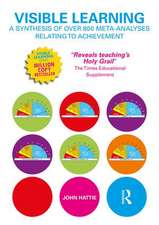Children's Informal Ideas in Science
Editat de P. J. Black, A. M. Lucasen Limba Engleză Hardback – 22 iul 1993
Children's Informal Ideas in Science addresses the question of whether children's ideas about science can be explained in a single theoretical framework. Twelve different approaches combine to tackle this central issue, each taking a deliberately critical standpoint. The contributors address such themes as values in research, the social construction of knowledge and the work of Piaget in a rich contribution to the debate without claiming finally to resolve it. The authors conclude with a discussion of how a theory can be built up, along with suggestions for ways ahead in the research.
| Toate formatele și edițiile | Preț | Express |
|---|---|---|
| Paperback (1) | 455.78 lei 6-8 săpt. | |
| Taylor & Francis – 6 iul 2016 | 455.78 lei 6-8 săpt. | |
| Hardback (1) | 1384.61 lei 6-8 săpt. | |
| Taylor & Francis – 22 iul 1993 | 1384.61 lei 6-8 săpt. |
Preț: 1384.61 lei
Preț vechi: 1688.56 lei
-18% Nou
Puncte Express: 2077
Preț estimativ în valută:
265.03€ • 287.98$ • 222.77£
265.03€ • 287.98$ • 222.77£
Carte tipărită la comandă
Livrare economică 21 aprilie-05 mai
Preluare comenzi: 021 569.72.76
Specificații
ISBN-13: 9780415005395
ISBN-10: 0415005396
Pagini: 258
Ilustrații: 1
Dimensiuni: 156 x 234 x 16 mm
Greutate: 0.54 kg
Ediția:New.
Editura: Taylor & Francis
Colecția Routledge
Locul publicării:Oxford, United Kingdom
ISBN-10: 0415005396
Pagini: 258
Ilustrații: 1
Dimensiuni: 156 x 234 x 16 mm
Greutate: 0.54 kg
Ediția:New.
Editura: Taylor & Francis
Colecția Routledge
Locul publicării:Oxford, United Kingdom
Cuprins
Contributors inlcude: Joan Solomon, Joan Bliss, Guy Claxton, Terry Russell, Jon Ogborn, Arthur Lucas, Neil Ryder, Jayashree Ramadas, Michael Shayer, Paul Black, Wynne Harlen
Descriere
This book offers much needed theory to back up a wealth of international research. It combines 12 critical approaches to tackle one central issue - whether children's ideas about science can be explained in a single theoretical framework.











